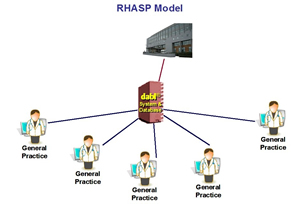Case Studies & Collaborative Projects >
Biron: Previous 24-hr ABPM service was time-consuming and costly
Biron Laboratories, the largest private laboratory in Québec recently signed up to the dabl® ABPM Health Screening system in French to improve the efficiency of their 24-hr ABPM service. Their previous service was time-consuming and costly. The process is now completely automated resulting in huge time and resource savings. The blood pressure results are..Case Study
August 2009: RAMBLER II (Role of Ambulatory Blood Pressure Monitoring in General Practice)
On the 1st of April 2009, enrolment of practices began for Rambler II, a follow-up study to Rambler I
(see link to paper below), the first ever review of 24-hr ABPM in Irish General Practice. Today there are
more than 100 practices from all over the country signed up to the Rambler II study, using the dabl ABPM
online system. The data from all these practices will help to understand how dabl ABPM is integrated into
Irish medical practice and how it contributes to the management of hypertensive patients. The data captured
by the dabl ABPM program will be made anonymous to allow researchers at National University Ireland, Galway
to describe the role and impact of Ambulatory Blood Pressure Measurement (ABPM) on daily clinical Irish
practice.
Each practice will also receive a confidential audit of their own practice in comparison to the average
of the dabl ABPM program network. The audit will give an idea of how patients are managed within practices
and compare mean day and night time blood pressure measurements.
It has been shown internationally that 25% of the patients were not recognised as having achieved target
with the use of Clinical Blood Pressure Measurement compared to ABPM. As a result of more adequate blood
pressure control by ABPM, patient’s medication can be adjusted or even stopped.
Keep an eye out for full results of the Rambler II study which will be published during 2010.
Reduction in Heart Attack and Stroke through Prevention (RHASP)

The RHASP study provides robust evidence that the dabl system has a significant
impact on the reduction of heart attack and stroke in a community. RHASP is a collaboration
between a group of general practices, a specialist unit in a large teaching hospital and the Irish Department of Health to reduce cardiovascular
morbidity and mortality in a cost-effective manner by facilitating prevention of
cardiovascular events in the community using computer assisted assessment and management
of cardiovascular risk factors.
The dabl Cardiovascular system allowed general practioners to use an expert system to monitor the
patient more aggressively. Furthermore, when advice on a patient was required, the
general practioner could simply telephone or email the consultant without having to refer the patient.
They could both access the patient record on the dabl system from their PCs, allowing
the consultant to recommend to the GP the most suitable form of treatment. This
became known as the "virtual consultation" and resulted in freeing up valuable resources
in the specialist centre.
The kernel of success of the RHASP project was that the GP could now prescribe more
aggressively and, as a direct result of this, a reduction in cholesterol and blood
pressure was achieved. On that basis, it is estimated that if this system was rolled
out on a national basis, the incidence of stroke and heart attack in Ireland could
be reduced by 50%.
Further information is provided in the RHASP report based on the independent assessment
by Professor John Cairns. You can download the report by clicking here (PDF file, 2MB).
New England Journal of Medicine, Ambulatory Blood Pressure Measurement, Prof. Thomas G Pickering (June 2006)
The unique software program, dabl ABPM (which makes reporting on 24-hour ambulatory blood pressure or ABPM efficient and accurate) has been highlighted for its unique qualities in a major article in the prestigious New England Journal of Medicine.
(Read full text)
The Rambler Study: The Role of Ambulatory Blood Pressure Measurement in routine clinical practice: A cross-sectional study
G Ni Uallachain, G Murphy, G Avalos (Oct 2006)
This study examines the use of ABPM in daily community practice in terms of patient demographics, change in pharmaceutical treatment, and the proportion of patients achieving recommended levels. Six practices using the dabl ABPM system participated in this cross-sectional study. Read how use of ABPM in general practice can have an impact on GP’s decision-making and on the medical management of hypertensive patients in the community. (Read full text)
Shared Care can help prevent heart disease(June 2005)
Report from Forum (Irish Medical Publication) on the RHASP study, to assess whether a collaborative hospital/primary care venture could reduce cardiovascular disease mortality. (Read full text)
Prevention always better than cure, Dr George Roberts (Jan 2004)
Dr George Roberts offers a personal perspective on the RHASP project, in which his practice is involved. The RHASP project has brought significant benefit to the practice and has resulted in improved care for his patients at risk of cardiovascular disease. (Read full text)
Our systems, along with our comprehensive consulting and analytical services, have been used in the following research studies:
- ASCOT (Anglo-Scandinavian Cardiac Outcomes Trial - http://ascotstudy.org/)
- ASCOT ABPM Sub-Study
- Blood Pressure Lowering in Essential Hypertension With an Oral Renin Inhibitor, Aliskiren - Alice Stanton, Chris Jensen, Juerg Nussberger, Eoin OBrien Hypertension 2003;42:1137-1143
- Ambulatory Arterial Stiffness Index as a Predictor of Cardiovascular Mortality in the Dublin Outcome Study
- Eamon Dolan, Lutgarde Thijs, Yan Li, Neil Atkins, Patricia McCormack, Sean McClory, Eoin O'Brien, Jan A. Staessen and Alice V. Stanton Hypertension 2006;47;365-370